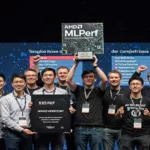This week I attended an interesting dinner put on by the Churchill Club showcasing the thoughts of Greg Becker the President and CEO of Silicon Valley Bank, and Arvind Sodhani EVP for Intel Capital. They waxed eloquently on some of the history from both firms and there were a number of interesting facts that came out on whether we are on a tech bubble, on Intel Capital’s amazing success, and on why China is going to kick the US’s butt everyplace thanks to the US Government.
Let’s talk to each in turn.
The Technology Bubble
One of the opening segments (and the format was mostly Greg Becker asking Arvind Sodhani questions) was on whether we are on a tech bubble. Greg argued we were and Arvind argued we were not. I’m afraid I was with Greg on this from the start so be aware of that inherent bias as you continue.
Greg argued we were based on the number of similarities to the last bubble. Tour Busses showcasing company headquarters (focusing on fame not financial performance), the massive number of young companies with valuations over $50B, and the massive valuations of companies that not only aren’t public yet but haven’t really figured out where their revenue and profit coming from.
Arvind argued this was a very different market than the one that existed in the late 1990s. It is easier to build and fund companies, China in particular is a gigantic raw market with salivating buyers who in massive numbers who will collectively buy most anything, and the leverage afforded these firms by technology is unprecedented in history.
However bubble is is basically when you have an overheated market where the valuation of firms isn’t supported by their business performance and only Greg actually spoke to that. Arvind’s arguments spoke to why a bubble might exist (because it was so easy to build firms that looked compelling) but he never really addressed any of the fundamental points that Greg founded his position on.
This I walked away concluding we are on a bubble, fortunately mostly supported by private money at the moment, but if it breaks it still could get ugly.
Intel Capital: Unsung Superstar
Intel Capital funds a massive number of companies in technology. What I didn’t know was they rank firms in the companies they fund getting profitably acquired and second in the number of companies that they fund that successfully go through IPOs. They’re success is based on the fact they husband their investments rigorously and actually provide services like connecting the firms to major customers that assures the success of these firms. In fact their success and value is likely more a result of the help they provide to the companies they invest in than it is the investment itself.
They are also very aggressive in looking for value. While they’re goal is to invest in firms that will further Intel’s efforts that doesn’t mean these firms every have to buy Intel technology. For instance, one firm who built really cheap home monitoring technology was selected not because they’d ever buy Intel parts but because their product would drive massive file growth in emerging markets (the videos have to be saved in the cloud) resulting in far more Intel server solutions being sold. That’s thinking long term and strategically.
How China’s Government Is Out Executing the US Government
The Silicon Valley Bank’s presentation on China was chilling. Apparently they are opening a branch in China and the regulators wanted to have a meeting with them. They went into the meeting expecting the kind of issues that US regulatory agents give US banks and facing a litany of accusations and rule compliance problems. Instead China’s Regulators just asked what they could do to help the Silicon Valley Bank get started in their country pledging to do whatever they could to make the opening of the branch flawless and successful.
Apparently, according to the Greg, China has a rolling 5 year plan to grow the country and economy and everyone is expected to step up and do their part. This contrasts sharply with US Regulators who seem more focused on wrapping these institutions with harsh regulations and costs and become a barrier to success. Recognize that is banks like the Silicon Bank that are critical to the birth and growth of young technology companies which is a clear priority for China and doesn’t seem to be much of one for the US.
Wrapping Up:
While my concerns about the Tech Bubble were reinforced by the event I remain impressed with the incredible work that both Intel and the Silicon Valley Bank are doing and a bit disappointed, but unfortunately not surprised, at how our government compares to China making me wonder if in 10 or 20 years that is where the next Silicon Valley will be. In any case it is always fascinating at the Churchill Club and tends to be one of the more interesting venues to attend if you want to know what is going on in the Silicon Valley.








